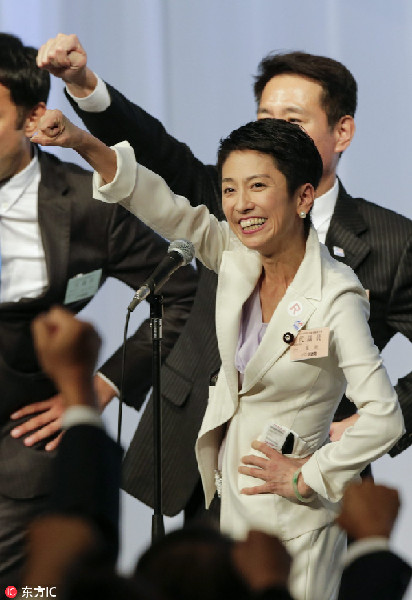 |
|
Reno Murata (F) raises her first while chanting a slogan encouraging themselves during a convention selecting Japan's main opposition Democratic Party's new chief in Tokyo, September 15. [Photo/IC] |
TOKYO - Japan's main opposition Democratic Party (DP) elected its first female leader Thursday as 48-year-old former TV newscaster Renho won the leadership election by a large margin.
Renho, acting president of DP, won 503 points out of a total of 849 election points, based on votes cast by the party's Diet lawmakers and party-endorsed candidates for national elections on Thursday as well as postal votes sent earlier by local lawmakers, lay members and registered party supporters.
Her two opponents, former foreign minister Seiji Maehara and lower house lawmaker Yuichiro Tamaki, won 230 and 116 points respectively.
Her victory was partly attributed to her fame and "calm demeanor before the media", according to local media.
Renho, former model and TV newscaster, has been a Upper House lawmaker representing Tokyo since 2004 and served for some time as minister for administrative reform during the rule of the Democratic Party of Japan (DPJ) between 2009 and 2012.
"I will take the responsibility as the party leader to build the party into one that people can entrust with the country," she said after winning Thursday's race.
"What we need to face now are the giant ruling parties," she reportedly said at a party convention after the victory.
The Democratic Party was established in March through the merger of the Japan Innovation Party and the Democratic Party of Japan.
The new leader, with her term running through to September 2019, will be tasked with setting a new path for the party to regain the trust of voters disillusioned by its predecessor DPJ when it was in power between 2009 and 2012.
She will also have to decide whether to continue the party's previous strategy of campaigning together with smaller opposition parties including the Japanese Communist Party, especially for the next lower house election, the timing of which depends on when Prime Minister shinzo Abe decides to dissolve the chamber.
Another challenge facing the new leader will be preventing the Abe administration from changing the war-renouncing Article 9 of Japan's Constitution at a time when pro-amendment forces have taken two-thirds of the seats in both chambers of the parliament.
Renho promised in her campaign earlier that she would safeguard the war-renouncing Article 9 at all costs, though she also expressed readiness to discuss with the ruling party changes to the Constitution.